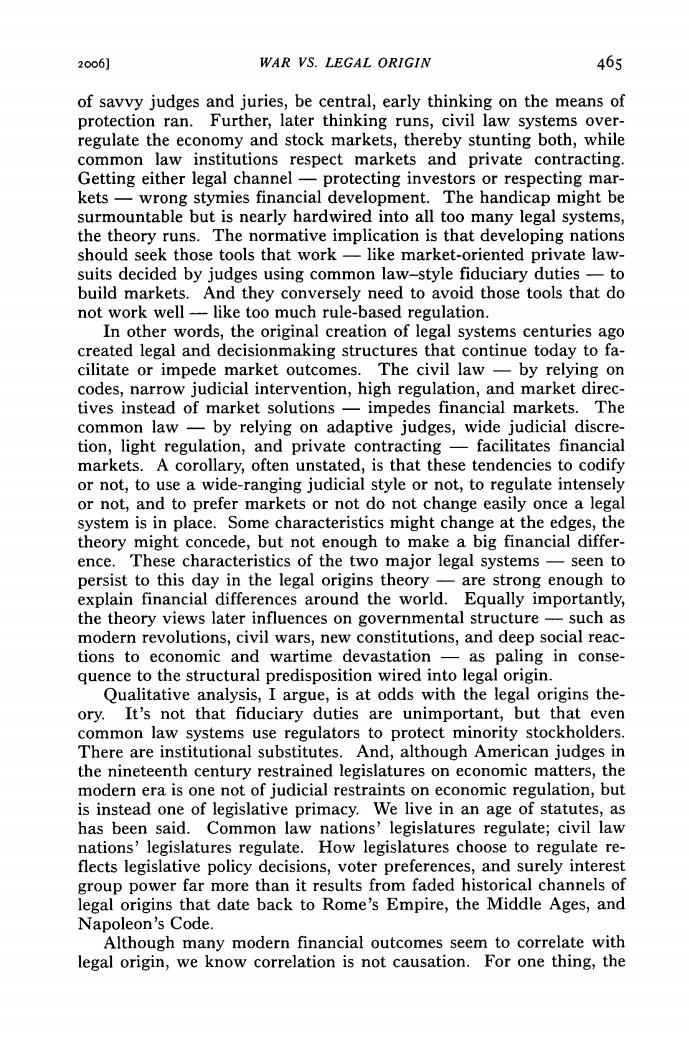正在加载图片...

20061 WAR VS.LEGAL ORIGIN 465 of savvy judges and juries,be central,early thinking on the means of prote ran Further,later thinking runs,civil law syster s ove regulate the economy and stock markets,thereby stunting both,while common law institutions respect markets and private contracting Getting either legal channel-protecting investors or respecting mar- kets- wrong stymies financial development.The handicap might be mountable but is nearly hardwired into all too many legal system ory rur The rmative i mplic. cation is that dev ing nation should seek those tools that work like marke t-oriented private law. suits decided by judges using common law-style fiduciary duties- to build markets.And they conversely need to avoid those tools that do not work well-like too much rule-based regulation. In other words,the original creation of leg gal systems centuries ago created legal and decisionm continu e toda to fa cilitate or impede aking structures market outcomes The civil law by relying on codes,narrow judicial intervention,high regulation,and market direc- tives instead of market solutions impedes financial markets The common law by relving on adaptive iudges.wide iudicial discre tion,light regulation,and private contracting facilitates financial market A corolla y,often unstated. that th se tendenc es to codify or not,to use a wide-ranging judicial style or not,to regulate intensely or not,and to prefer markets or not do not change easily once a legal system is in place.Some characteristics might change at the edges,the theory might concede,but not enough to make a big financial differ- ence These characteristics of the two major legal systems- seen to persist to this the legal orig s the e strong eno ugh to explain financial differer ces around the world. Equally importantly, the theory views later influences on governmental structure such as modern revolutions,civil wars,new constitutions,and deep social reac- tions to economic and wartime devastation as paling in conse quence to the structural predisposition wired into legal origin Qualitative nalvsis argu is at ory. It's not that odds with the legal origins the fiduciary uties are unimportant but ha common law systems use regulators to protect minority stockholders There are institutional substitutes.And,although American judges in the nineteenth century restrained legislatures on economic matters,the modern era is one not of iudicial restraints on economic regulation.but is instead one of legislative primac We live in an age of statutes,as been Commor ture regulate;civil law nations'legislatures regulate.How legislatures choose to regulate re flects legislative policy decisions,voter preferences,and surely interest group power far more than it results from faded historical channels of legal origins that date back to Rome's Empire,the Middle Ages,and Napoleon's Code Alth n many modern financial outcome eem to correlate with legal origin,we know correlation is not causation.For one thing,the WAR VS. LEGAL ORIGIN of savvy judges and juries, be central, early thinking on the means of protection ran. Further, later thinking runs, civil law systems overregulate the economy and stock markets, thereby stunting both, while common law institutions respect markets and private contracting. Getting either legal channel - protecting investors or respecting markets - wrong stymies financial development. The handicap might be surmountable but is nearly hardwired into all too many legal systems, the theory runs. The normative implication is that developing nations should seek those tools that work - like market-oriented private lawsuits decided by judges using common law-style fiduciary duties - to build markets. And they conversely need to avoid those tools that do not work well - like too much rule-based regulation. In other words, the original creation of legal systems centuries ago created legal and decisionmaking structures that continue today to facilitate or impede market outcomes. The civil law - by relying on codes, narrow judicial intervention, high regulation, and market directives instead of market solutions - impedes financial markets. The common law - by relying on adaptive judges, wide judicial discretion, light regulation, and private contracting - facilitates financial markets. A corollary, often unstated, is that these tendencies to codify or not, to use a wide-ranging judicial style or not, to regulate intensely or not, and to prefer markets or not do not change easily once a legal system is in place. Some characteristics might change at the edges, the theory might concede, but not enough to make a big financial difference. These characteristics of the two major legal systems - seen to persist to this day in the legal origins theory - are strong enough to explain financial differences around the world. Equally importantly, the theory views later influences on governmental structure - such as modern revolutions, civil wars, new constitutions, and deep social reactions to economic and wartime devastation - as paling in consequence to the structural predisposition wired into legal origin. Qualitative analysis, I argue, is at odds with the legal origins theory. It's not that fiduciary duties are unimportant, but that even common law systems use regulators to protect minority stockholders. There are institutional substitutes. And, although American judges in the nineteenth century restrained legislatures on economic matters, the modern era is one not of judicial restraints on economic regulation, but is instead one of legislative primacy. We live in an age of statutes, as has been said. Common law nations' legislatures regulate; civil law nations' legislatures regulate. How legislatures choose to regulate reflects legislative policy decisions, voter preferences, and surely interest group power far more than it results from faded historical channels of legal origins that date back to Rome's Empire, the Middle Ages, and Napoleon's Code. Although many modern financial outcomes seem to correlate with legal origin, we know correlation is not causation. For one thing, the 2oo6]